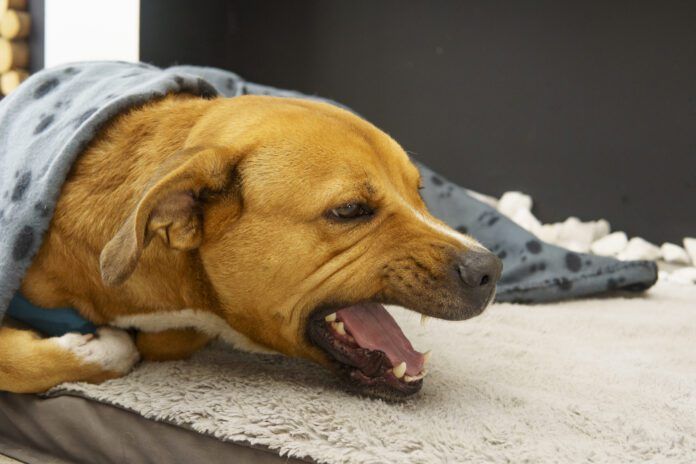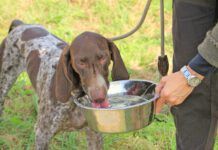As I listened to my dog cough the other night, I found myself shifting out of my logical veterinarian mindset and into my role as pet parent. Nobody likes it when their fur baby is not feeling 100%, including us veterinarians. When it does happen, I do try to remind myself that it is an opportunity to reacquaint myself with what it feels like to be on the other side of the exam table. Having a coughing dog is a great example of this because when there is a kennel-cough outbreak in the area, my veterinary hospital fields a lot of questions.
However, remember that kennel cough isn’t the only reason dogs cough. Heart disease and heartworms can also make a dog cough.
Pneumonia, which involves the lung more than the trachea/bronchi, can cause coughing but is more likely to be a softer moist cough than a honking cough. Dogs with pneumonia often feel sicker. They are more likely to be febrile, lethargic, and expend more respiratory effort to breathe.
Other causes of coughing include collapsing trachea, allergies, internal parasites, irritants, and neoplasia.
But, kennel cough does have a classic cough that sounds very much like a honking goose. The cough is loud, dry, and harsh. Concerned pet parents often describe the cough as sounding like their dog has something lodged in his throat. If your dog was totally fine and had something in his mouth right before sudden onset significant coughing/gagging began, then an object/food in her airway (or esophagus) is more of a possibility than if onset of coughing was more gradual.
So, what do you do when you suspect your dog has kennel cough?
- Don’t panic! Remember it is usually self-limiting and will clear on its own.
- Keep all the dogs in your household home (even if they haven’t started coughing) and don’t return them to activities until two weeks past cough resolution.
- Consult your veterinary team to determine if your pet needs to be seen for evaluation.
- Monitor all dogs but especially those that might be at higher risk for complications (very young, very old, immuno-compromised, underlying health issue) for signs of more severe illness.
- Rest your dog (keeping her calm and skipping high energy activities can help limit the coughing).
- Get a video of your dog coughing at home that you can share with your veterinary team if needed.
- If you are taking your dog to the veterinarian, notify the office of your arrival before bringing your pet inside the building, as they may have special instructions to limit contact with other pets in the waiting room.
What Is Kennel Cough?
Kennel cough is the common name for a highly contagious respiratory illness of dogs also known as infectious tracheobronchitis and canine infectious respiratory disease complex (CIRDC). Most commonly it presents as a dog that is still active but has a honking cough, often with a gag at the end of the coughing spell. If the gag is significant enough sometimes the dog will bring up phlegm or some of their most recent meal.
In otherwise healthy pets, most of the time it is an illness that is more annoying than life-threatening. When I say annoying, I mean both for the dog (because we all know coughing is not fun) and for the pet parent who empathizes with the dog and may experience some additional inconvenience such as cleaning up the phlegm/stomach contents that the dog gags up or disruption to plans.
Because kennel cough is highly contagious and spread through aerosol, direct contact, or contact with contaminated objects, other challenges for the pet parent can include having the illness go through all the dogs in the house one by one or having make short notice pet care arrangements because the dog can’t attend day care, grooming, or boarding facilities while contagious. Dogs should also not frequent dog parks, attend any dog competitions or go with their pet parents to visit households with other dogs.
Humans who are in contact with kennel-cough dogs should take care to wash hands thoroughly, change shoes, and clothes before being around other dogs so as not to spread the illness. There should be no sharing of toys or bowls although if in the same household there is probably already so much direct contact between family dogs that this may be a moot point.
As the name suggests, kennel cough most commonly spreads when a group of dogs are in common space together indoors such as in a boarding or daycare setting. Dog shows, dog performance events, or animal shelters can be another location of common spread because pets are coming together from many different areas and spending time in relative proximity to each other. It only takes a single dog that is infected with kennel cough (and possibly not even showing signs yet) to infect another dog.
The kennel cough vaccine usually starts with Bordetella bronchiseptica (bacteria) and often includes parainfluenza with or without adenovirus, but they are not the only infectious agents that cause these symptoms. If you have ever wondered why this vaccine is commonly given intranasally, it is because it allows not just for systemic antibodies but also antibodies that stay in the respiratory tract (secretory IgA) where they can act as a first line of defense. There is also a separate vaccine for two different strains of canine influenza (another virus that can often cause the same symptoms).
Why Is My Dog Coughing and Gagging?
“Why is my dog coughing from kennel cough when I got her vaccinated?” is one of the most common questions I get asked when I diagnose a dog with kennel cough. The reality is that kennel-cough symptoms can be caused by many different bacteria and viruses, and sometimes they can appear in combination. This is why a more recent medical term for kennel cough is CIRDC.
Kennel cough is most often diagnosed by physical exam and patient history. A common physical exam finding is increased tracheal sensitivity on palpation of the trachea. For cooperative dogs, this is a quick easy thing for your veterinarian to check as part of your dog’s exam because they can reproduce the coughing in the exam room to hear it for themselves.
Dogs can have tracheal sensitivity for other reasons so the veterinarian must consider the history and entire “picture” the dog presents but an absence of tracheal sensitivity typically moves kennel cough down my list. Most commonly the dog has a history of boarding, daycare, dog park (yes, it can spread outdoors), recent grooming, being in a shelter, or being exposed to another dog that has been one of these places. Sometime the infected dog isn’t coughing because she hasn’t started showing symptoms or she could have a subclinical case and appear asymptomatic.
Kennel Cough’s Tricky Diagnosis
It is possible to test for the offending infectious agent(s) but getting a conclusive diagnosis can be challenging. The samples usually need to be collected within the first couple of days of onset of symptoms. Many dogs don’t even see the veterinarian that early in their illness. Also, sample collection involves swabbing the pharynx (throat), nasal passage, and/or conjunctival area of the eye. We have probably all had enough COVID testing swabs done on ourselves by this point to understand that many dogs will object to this process and could requite mild sedation to collect samples.
Add on top of these factors that the test itself is not inexpensive, takes several days to return results, and may not produce a diagnosis. Reasons for not identifying an organism on the respiratory panel can include sample collection issues (timing, uncooperative patient) or a causative agent not severe enough/not studied enough to be included in the panel. All this is in the face of an illness that is generally self-limiting. This means a lot of pet parents will opt not to test. That doesn’t necessarily mean it is never worth testing, it just means one should have proper expectations.
In addition to the physical exam and patient history additional diagnostics such as X-rays, complete blood count, heartworm testing, and a fecal exam may help with diagnosing the cause of a cough.
Kennel Cough Requires Home Care
The good news is most dogs get better from kennel cough on their own with just a little time and TLC. Most of them don’t need antibiotics (remember, it is often viral, which antibiotics won’t help). Limiting high-energy activity can help because often the more excited the dog, the more they cough.
If the coughing is severe, your dog may need medication or treatment to help manage the cough either through suppressing the cough or decreasing the inflammation. The bad news is your dog needs to not go anywhere where she could infect other dogs for about two weeks AFTER symptoms resolve and the dog is off medication. It also means you should take appropriate precautions if you are in contact with any other dogs when you leave the house. As I mentioned earlier, this involves things like changing clothes/shoes and handwashing.







The article failed to mention blastomycosis as a cause of a cough. My dog was first diagnosed with pneumonia and then lymphoma before being treated for blastomycosis after changing clinics. I am happy to say that we changed vets just in time and she survived.
I keep reading (from vets) that Kennel cough isn’t a life-threatening problem. I believe I had it as a teenager and it was really not more than a nuisance.
When we consulted a highly recommended local vet, when our dog was recovering from a Lyme-induced hind limb disfunction and a collapsed trachea problem that got worse after swallowing a too big piece of food that temporarily got stuck in his throat, the veterinarian didn’t do any exam on the problems our dog presented. He did a (in my opinion) very sloppy general exam where he found a heart murmur but he didn’t find a hard almost 0.5″ diameter immobile ball which I found 4 days later behind the ribs.
What the vet did instead, in his self-assumed function as an extension of “THE LAW” enforcement, was to inject our dog with the rabies vaccine (he wanted to inject several other vaccines, but I was able to get him to keep those syringes capped) although our dog had a positive titer and the vet knew that he’d be drawing blood for a blood analysis where he’d get the results back the next day; he COULD have included a new rabies titer but he wasn’t up to it. Despite the ongoing health problems and the freshly found heart murmur, the man STILL injected the 15-year old dog. Within 10 days a completely new set (of at least 4 different/new) symptoms arose and within 2 months our boy died after a long struggle to overcome the new assault.
During this really hard struggle for survival, I found out that all rabies (and likely other) vaccine manufacturers repeatedly state on their websites to their customers (aka veterinarians, other resellers) and likely also their package inserts (but ‘our’ vet office never forwarded me a copy) that their products are ONLY to be used on HEALTHY ANIMALS. So, either this vet was completely incompetent/naive on this topic (which is a scary problem by itself) or he had other reasons (which is horrendous, considering that he dares to display a copy of the veterinary oath in his exam room).
During my useless attempts to find out more from this veterinarian, I discovered that this man and the other veterinarian in this clinic had sold out to one of the currently 16 huge veterinary company consolidation structures, in his case ‘a private equity-backed company that has undergone multiple funding rounds and recapitalizations….’ I can easily imagine that these financial ‘structures’ have things other than an animal’s health in their mind (i.e., profit and my guess is that these conglomerates are owned predominantly by pharmaceutical companies who use veterinarians to increase profits and not animal health).
My lesson is: Do not go to a veterinarian UNLESS you know for sure that the person you’re going to see still fully believes in and can act on the principles that made them go into this field of healing(!) in the first place (so ‘my’ next vet definitely wouldn’t be working for a dubious equity-funded entity). If not 100% sure about the person’s integrity and intent, I’d rather take all the responsibility of care on my own shoulders because I know that I always will try my best to help our animals. It’s not random that our 15 year old pup didn’t require veterinary care all his life. And when he saw a vet…
Not common in much of the country, but a dry cough in the southwest deserts can be valley fever, aka Coccidioidomycosis. Nearly every dog exposed to dirt has been exposed, and those with lower resistance for whatever reason can contract the disease, which is treated with anti-fungal oral medication like fluconazole.